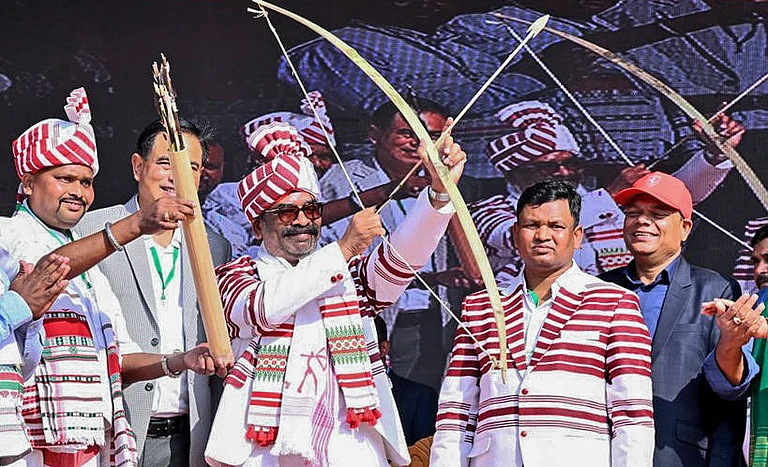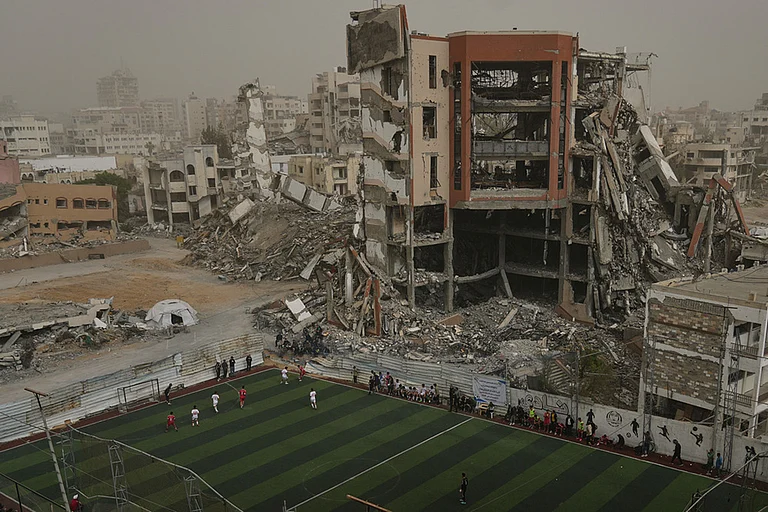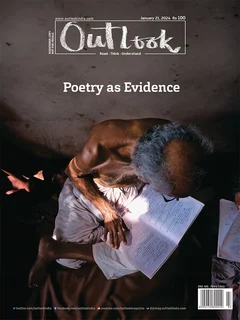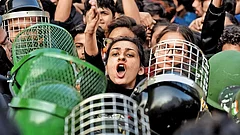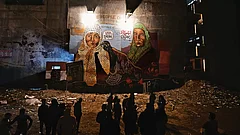Jarawa
On a quest of the Oceans
A scientist from a distant country
Reached the lands of Andaman.
Saw a Jarawa Adivasi…
Who got scared by the encounter
But the scientist was delighted…
The scientist said…
Oh God… Very Nice… And wonderful
In front of the mountain-like Jarawa,
The scientist looked like an ant…
A lot like Xuanzang, who had travelled to distant places, the scientist was a bibliophile…
He was a voyager, a lot like Columbus, and Vasco de Gama.
He conducted experiments, like Newton and Einstein…
And would make attempts at writing like Shakespeare…
But fell short, of reading the nature
And then and there came a terrible Tsunami…
Andaman’s Adivasis went up in the mountains…
But the scientist and the ship perished in
the Tsunami… Swept away with all their companions.
Scientists from around the world were left stunned.
How do the Adivasis survive…
O Scientists, researchers…
Jarawa are a part of nature!
They know the gestures of the fish and the crocodile,
The speech of the birds and the animals…
With them,
They had gone away…
But the scientists were engaged in their discoveries…
and people drowned in hollow pits…
In the hollow, hollow
Tsunamis of the seas!
—Translated from Hindi by Pratyush Pushkar
जरावा
दूर देस घुमनारा चाफल्या...
समिंदर चाफलत... चाफलत...
आंदमान ना बेटवर डूकल्या माराला लागना....
तेन्हा डोलाला जरावा आदिवासी दखायना...
जारवाला दखी तो भेमकायना...
तेन्ही दात खिल्ली बसनी...
मातर तो खुशीमं बोंबलना...
वो गॉड... गॉ़ड... व्हेरी नाईस... ॲण्ड वंडरफूल...
पाहाडनागत धिप्पाड जरावापुढ तो...
आभ्यासकर्ता जरुका ठूसक्या दखाता...
तब्बेत न बी आन् बुध्दीथाईन...
दूर – दूर देस फीरी तो युआन शॉग ना गत ग्रंथ
वाचता माहिती जमाड्या
कोलबस... वास्को द गामा ना गत...
जमीनना खोजलावता...
न्यूटन अन् आईनस्टाईन ना गत परयोग करता...
अन् सेक्सपियरना गत लिवता बी....
मातर तो निसर्ग वाचाला चुकना....
ह्या येल ला... सुनामी उन्ही
आंदमान ना एक – एक आदिवासी उंचा डोंगर चढी गेत
मातर आभ्यासकर्ता अन् तेन्हा जाहाज सुनामीमं
डूबी ग्या... तेन्ह साथीदार सोबत...
जगभरन शास्त्रज्ञ तोंडमं बोट घालनत...
आठूल आदिवासी... वाचनत कस्से...
भाऊ... चाफलेस्वा...
जरावा निसर्गना संग जग...
मास-काट सना इशारा...
आन् रानपाखरुनी बोली वलख...
तेसनासंग ते कव्हाच दूर नीघी गयत...
तेन्हा आभ्यास करणारा चाफले मातर...
डूबी गेय... खोल – खोल समिंदरमं...
खोल – खोल सुनामीना पानीमं....
Sunil Gaikwad, Maharashtra
(Author of 12 books, Sunil Gaikwad is an Adivasi poet from the Bhil community. His works have documented the struggles of the Adivasi community and have upheld the values of Adivasi lives, far beyond the deterministic civilisational ethos.)
Mountain Child
The mountain child —
a fragment of the mountain —
plays in the lap of the mountain
Toddling up the mountain
he plants his feet in the mountain soil
to rise like a mountain
in the land of mountains
The whole mountain
lives inside the mountain child
And in the lap of the mountain
lives the scurrying mountain child
The mountain child sees
a plane flying over the mountain
And he asks his father —
What is that bird?
—Translated from Hindi by Lucy Rosenstein
पहाड़ी बच्चा
पहाड़ की गोद में
पहाड़ के छोटे-छोटे टुकड़ों सा
खेलता है पहाड़ी बच्चा
लड़खड़ाते क़दमों से पहाड़ चढ़ते
रोपता है पहाड़ी धरती पर पाँव
पहाड़ी माहौल में
पहाड़ की तरह
पूरी ताकत से उगने के लिए
पहाड़ी बच्चों के भीतर होता है
पूरा का पूरा पहाड़
और पहाड़ों की गोद में होता है
दौड़ता-भागता पहाड़ी बच्चा
पहाड़ी बच्चा देखता है
पहाड़ के ऊपर से गुज़रता जहाज
और पूछता है पिता से
उस नए पक्षी के बारे में
Nirmala Putul, Jharkhand
(Nirmala Putul was born in Kurwa village, Dumka, Jharkhand, in 1972. She started writing poetry in Santali/Santhali in the 1990s but shot into literary fame after her poetry was translated by Ashok Singh and published in two collections: Apne Ghar Ki Talash Mein (In Search of One’s Own House, 2004) and Nagare Ki Tarah Bajti Shabd (A Voice Like the Thundering of Drums, 2005))
For the Hills
Those selling out their integrity
For a few pieces of silver,
How would they comprehend ever,
Why some people lay down their lives
For the sake of the hills.
—Translated from Hindi by Bhumika Chawla-D’Souza
Jacinta Kerketta, Jharkhand
(Jacinta Kerketta is a journalist, poet and activist. Her poetry deals with identity crisis of Adivasi youths, systemic oppression of Adivasis in the country, gender- based violence, especially against women, and displacement. It also questions the state apathy of governance.)









